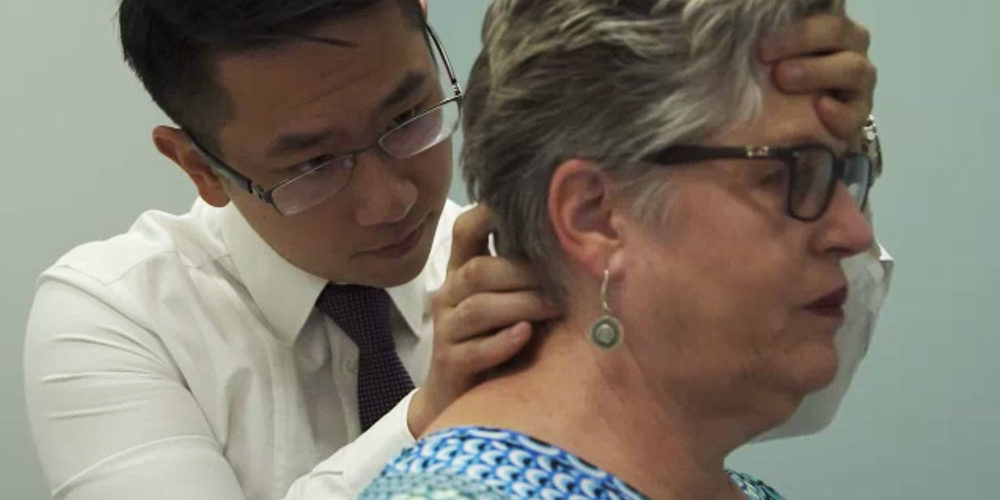Neck Pain Physiotherapy
Acute & Chronic Neck Pain Treatment in Daisy Hill
Chronic neck pain is a prevalent issue that can stem from various causes, with acute injuries often evolving into persistent discomfort. Acute neck pain typically results from joint or muscle strain, such as overstretching or tearing of tendons and muscles, or soft tissue sprain involving ligaments. These injuries often occur due to sudden forces, such as whiplash from car accidents or sporting activities. Prolonged awkward positions, like poor sleeping posture or work ergonomics, can also contribute to neck strains.
The blood supply to the soft tissue in the neck facilitates relatively quick healing of minor injuries, providing relief within days or weeks. Non-surgical interventions, including ice, heat, and physiotherapy, play a crucial role in reducing recovery time and alleviating pain during the healing process.
At The Brisbane Spine Clinic, we have a special interest in chronic neck pain and provide tailored physiotherapy, even in cases with severe degenerative findings on MRI or CT scans. Some of our clients, prior to seeking our physiotherapists, had been offered invasive treatments like steroid injections, radio-frequency nerve ablation, and surgery.


Common Symptoms of Neck Pain
- Sharp stabbing pain in one spot
- Tenderness in the affected area/s
- Stiffness and tightness that restricts head movement
- Pain that travels down the shoulders or arms
Severe Symptoms of Neck Pain
- Tingling or numbness that radiates down the upper back, shoulders or arms
- Difficulty gripping onto objects
- Pain with head movement in multiple directions
- Difficulty stabilising the head
- Dizziness, unsteadiness and/or double vision
- Loss of balance
- Loss of bladder control
In some cases, neck injuries can become continuous and radiate into other parts of the body such as the back, shoulders and arms. Increasing neck pain is a concern and should be evaluated further by your physician.
Causes of Strains and Sprains to the Neck
Although neck pain is a very common symptom, it can interfere with daily activities as well as our ability to have a good night’s sleep.
Sprains and strains are surprisingly common and can be brought on in many ways. A strain refers to a muscle or tendon being overstretched or torn while a sprain refers to a ligament being stretched or torn.
Common causes of neck strains and sprains include:
- Sports injury – a sudden movement of the neck or a collision.
- Poor posture – a tilted head for extended periods of time.
- Neck pain from sleeping in a bad position – overextending the neck for a long period of time.
- Whiplash – a jolting of the head back and forth.
- Repetitive motions – common in swimming or dance routines.
Chronic Neck Injury Causes
Neck pain is considered chronic when it continues for an extended period of time, where soft tissue injuries would normally have healed.
Usually, chronic neck pain conditions are related to the cervical spine. Common causes may include:
Cervical Degenerative Disc
This is a natural process of wear and tear on the cervical spine over time. The discs in the spine slowly lose hydration and are unable to effectively cushion the vertebrae. In more severe cases, further degeneration can lead to a painful pinched nerve or a herniated disc.
Cervical Herniated Disc
This occurs when the protective outer layer of the disc tears and allows the jelly-like inner layer to leak though. Herniated discs may press against the cervical nerve or come close enough to cause irritation.
Cervical Osteoarthritis
The facet joints in the spine are supposed to move smoothly on the cartridge cushioning. However, as the facet joints wear down over time, they may grind bone on bone. This also places a risk on the nearby nerve to become pinched or pressed.
Cervical Spinal Stenosis with Nerve Root Compression (myelopathy)
Spinal stenosis is caused by a narrowing of the spinal canal which may be caused by a herniated disc pushing into the spinal canal. As the spinal canal narrows, the spinal cord is at risk of being compressed resulting in myelopathy. Compression of the spinal cord may lead to symptoms of weakness and co-ordination issues with arms and legs.
The common belief from an orthopedic perspective is that a degenerated or herniated disc may lead to more serious conditions such as cervical osteoarthritis or nerve root compression commonly known as a pinched nerve. Recent anatomical studies have shown that the actual incidence of this is not high and nerve function is not affected even with a high percentage of spinal compression. A new perspective is that disc degeneration is a natural part of the normal ageing process and is not a direct cause to many of the symptoms you may be experiencing.
What does chronic neck pain physio involve?
Chronic neck pain physio treatment begins with a thorough assessment of your:
- Range of motion – identifying any stiffness or tightness
- Flexibility
- Strength.
Your physio then uses evidence-based approaches to ease your chronic neck pain. These may include:
- Hands-on treatment to massage the soft tissues of your neck or mobilise your neck joints
- Prescribe tailored exercises which may include:
- Stretches to encourage ease of movement
- Strengthening the muscles that support your neck
- Advising you on how to improve your posture (if that is the cause of your neck pain).
Comprehensive Solutions for Neck Pain Relief
Our approach at The Brisbane Spine Clinic involves a comprehensive strategy for neck pain treatment. We utilise physiotherapy to meticulously examine and enhance the mobility of the upper thoracic spine, improve the function of shoulder girdle muscles, and desensitize cervical nerve roots. This approach aims to alleviate neck pain symptoms. Our musculoskeletal physiotherapists provide tailor interventions, addressing the root causes and providing a holistic solution for the relief of chronic neck pain.
Request an appointment
More services
Senior Musculoskeletal Consultant


Mr Yu-Tsung (Justin) Lin
- B.Phty 2009 UQ
- CSMT (Certificate in Spinal Manual Therapy) 2010
- Kinesiotape Level 1 2010
- Ridgway Method Paradigm 2011
- M. Phty (Musculoskeletal) 2013 UQ
- Mulligan Concept Upper Quadrant 2015
- Mulligan Concept Lower Quadrant
Why choose our clinic
From the moment you book in for your consultation till the completion of your neck pain treatments, you will realise The Brisbane Spine Clinic difference.
- Peace of mind
- Trust
- Clear communication
- Dedication and commitment
- Highest level of care
- Problem-solving approach
- Second opinions
- Non-invasive treatment
